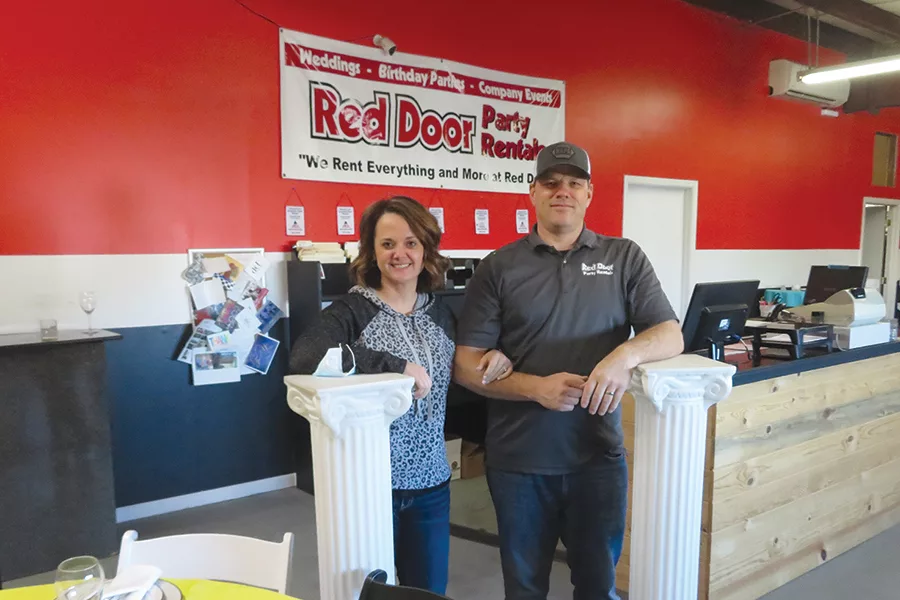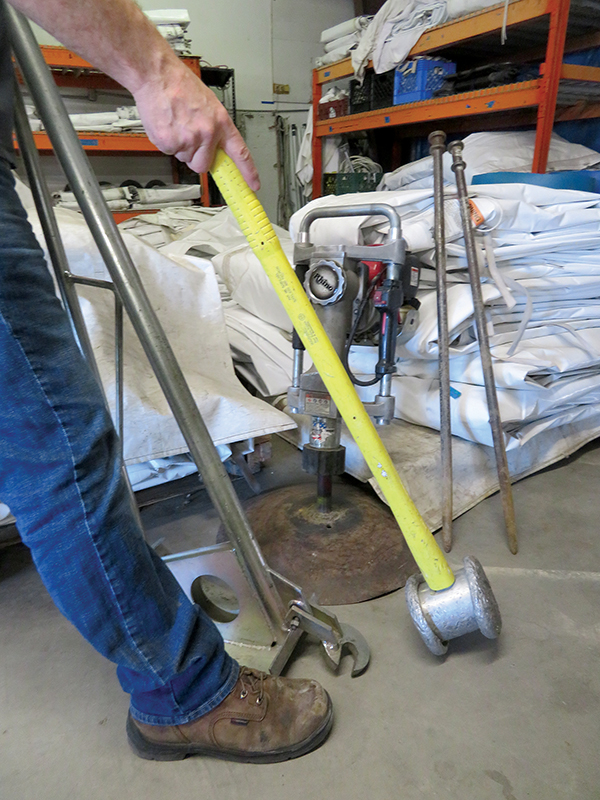
Home » Party supply company sees ebbs, flows of Tri-City hospitality sector
Party supply company sees ebbs, flows of Tri-City hospitality sector

March 15, 2021
A third-generation rental store owner isn’t looking to the future with the fear she felt a year ago.
Today, she’s planning with Covid-19 in mind. And it appears so are her customers.
“Right now, customers are booking with the mandates in place, so they know what they’re dealing with. Last year, they cancelled,” said Tammy Stoflet of Red Door Party Rentals.
“People are planning with Covid in mind. I don’t think anyone is planning they’re going to be free and clear (of regulations). We’re seeing a lot of 30- to 40-people events versus 200- to 300-people events,” she said.
Tammy and her husband P.J. Stoflet operate party rental supply stores in Kennewick and Richland and have had a front-row perspective on how the Tri-City hospitality industry has weathered the pandemic.
Family business bound
Stoflet, 42, and her husband bought The Red Door Party Rentals stores from her father in 2007. That’s also when they dropped “The” from the business’ name.
P.J. takes care of all the equipment, most of the deliveries and is the point of contact for large customers wanting canopies, usually working out of the 1331 Wyman Road store in Richland. Tammy handles the administration side and works the counter at the store at 7501 W. Kennewick Ave.
They have three employees.
Tammy’s grandfather, Virgil Rose, launched the family business when he bought Gordy’s Rentals in Moses Lake and started Northwest Rentals and Northwest Rentals II in Richland.
Her father, David Rose, took over the business and opened D&D Rents in the Richland Wye in the late ’70s. He opened Northwest Rentals on Wellsian Way in the late ’80s and West Richland Rentals in the early 2000s. He bought Red Door in the early ’90s.
Rose still owns the Northwest Rentals and West Richland stores today; Tammy’s brother-in-law Bob Marshall operates them.
Rose closed D&D Rents at the end of 2020, a casualty of the pandemic.
“That one hurt his heart quite a bit. Covid was the nail in the coffin,” Tammy said.
When Tammy left the Tri-Cities to attend Eastern Washington University, she didn’t plan on returning – or going into the family business. She earned a business degree, got married and moved to Spokane.
But life has a funny way of changing your perspective.
She began wondering why she should work for someone else when she could be her own boss. She thought about the flexibility of owning her own business when she and P.J. began to raise their family.
So the couple moved to the Tri-Cities, and P.J. managed D&D for a few years.
All the party supplies
Tammy has seen the ebb and flow of the hospitality industry from a unique vantage point. Her business supplies many of the items needed for weddings, fundraisers and other big community events.

They rent dance floors, tables, chairs, china, glassware – everything needed for a wedding reception or other big event, and more.
When the Stoflets took over, they ventured into offering bigger canopies.
“We had an existing contract with a local car dealership in town. We’ve changed with their demand,” Tammy said.
Their largest canopy is 40-by-140, a huge tent that takes about eight hours to put up with industrial-grade tools to secure them. The smallest size runs 20-by-20.
Their heavy-duty canopies aren’t the flimsy stuff of pop-up sun shades, but come from canopy manufacturers and boast high wind ratings, up to 75 mph.
Their biggest canopy customers are car dealerships, caterers, corporations and nonprofits, which hold events like the Sausage Fest in Richland or Hogs & Dogs in West Richland.
After that, it’s weddings.
Deluge of cancellations
“Everything was going great at the beginning of last year. 2020 started out to be a record year. Everybody wanted to get married that year. We were starting to see reservations and the bookings,” Tammy said.
Then news about the pandemic hit along with the shutdowns.
“We didn’t know what to do. There were no ringing phones. There was a weird lull. Everybody was like, ‘What’s going to happen?’ she said.
And the business was gearing up to bring on extra employees.
“We usually hire eight to 10 in spring and summer. We should have been trying to hire. Instead, we had to lay everybody off,” she said.
It was the hardest business decision they’d had to make. Tammy said she cried for days.
But it was also the right decision at the time to let their five employees go, she said. Two of them were going on their ninth year at Red Door. One had been with them three years. Another was seasonal. A part-timer was a niece.
“It also allowed us to breathe. I knew they had applied for unemployment. It was the biggest relief for us,” she said.
The business closed its doors to the public for four weeks and transferred the business phone lines to their home.
“During that time, all we dealt with were cancellations,” Tammy said.
Tammy said their customers were fantastic to work with and most didn’t mind when their small business asked if they could process their refund within 30 days, instead of immediately, to help with their cash flow.
“I didn’t have a single person who said, ‘I want it now.’ They were very, very supportive. They all felt awful for having to cancel,” she said.
Calls for the canopies
After the shock of all the cancellations, businesses started inquiring about canopies.
Hospitals and food processors between the Tri-Cities and Connell wanted to set them up outside their entrances for health screenings or to create extra space during lunch breaks. They signed long-term contracts with Red Door.
Restaurants then came calling for canopies to accommodate outdoor seating.
And with the region’s move into Phase 3 in March with indoor dining now allowed, “all the long-term rentals have all come down,” Stoflet said.
Limping along
The business didn’t get approved for Personal Paycheck Protection money or state grants, though it applied twice. It did receive a grant from the Small Business Administration and Benton County in the fall.
“That was huge for us,” she said. “We kept saying, ‘All the bills are paid,’ and that’s all I cared about.”
One bill they didn’t have to worry about was their rent. Tammy’s dad owns their buildings.
“I didn’t have that fear. That alone made things easier. For me, I never had that fear I was going to lose my business, which allowed me to not freak out as much,” she said.
Red Door’s orders went from 200-plus to 30. “We scaled way back to pay the bills and limped along,” she said.
The leaner business model revealed some cost-saving opportunities.
“It did kind of open P.J.’s and my eyes about how much money we spent on things we didn’t need to spend it on and how to run this business, things to scale back ... it helped us moving forward. We have a better understanding of payroll and finances,” she said.
Looking ahead
By summer 2020, Red Door was able to rehire three laid-off employees part time. They’re doing a work-share, collecting a percentage of unemployment to cover the hours they’re missing.
The stores continue operating on a reduced schedule of 20 hours a week, though the Kennewick store recently expanded to 24 hours a week beginning March 13.
“We’re optimistic. We feel the need is there to start moving forward, just not on the scale it usually is,” Tammy said.
The Stoflets said they’re heading into 2021 “pretty hopeful.”
People are still getting married, though none of the usual nonprofit and community events have booked yet, Tammy said.
“I feel bad for these nonprofits. Their events they have during year is how they survive and … this has had such a ripple effect,” she said.
But for Red Door to return to “normal,” Tammy said they would need the return of these annual events.
“I don’t know when we’ll see some of that,” she said, but said she’s learned to go with the flow in the last year.
“At one point I finally said, ‘I can be negative, or I can just roll with it.’ It was so dark and gloomy and I couldn’t do it anymore,” she said. “I do know we survived last year with what took place. I feel we’ll be fine this year with what takes place.”
Local News Hospitality & Meetings
KEYWORDS march 2021





